
Shamshad Begum was an Indian singer who was one of the first playback singers in the Hindi film industry. Notable for her distinctive voice and range, she sang over 6,000 songs in Hindustani, Bengali, Marathi, Gujarati, Tamil, and Punjabi languages, among which 1287 were Hindi film songs. She worked with renowned composers of the time, such as Naushad Ali and O. P. Nayyar, for whom she was one of their favorites. Her songs from the 1940s to the early 1970s remain popular and continue to be remixed.
Rajkumari Dubey, better known by her first name, Rajkumari, was an Indian playback singer who worked in Hindi cinema of 1930s and 1940s. Best known for her songs, "Sun Bairi Baalam Sach Bol Re" in Bawre Nain (1950), "Ghabaraa Ke Jo Hum Sar Ko Takraayan" in Mahal (1949) and "Najariya Ki Maari" in Pakeezah (1972).
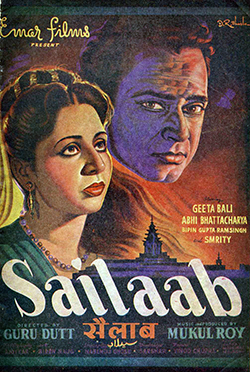
Sailaab is a 1956 Hindi movie which tells the story of Gautam, a rich young man, who goes to Assam to visit his father's tea plantation. The plane in which he is travelling is forced to make an emergency landing due to bad weather. Gautam gets hurt and suffers from amnesia. He falls in love with a young woman Kanchan, who responds to him even though she is part of a religious community that doesn't allow its members to marry. The film was directed by Guru Dutt and produced by Guru Dutt's wife, Geeta Dutt's brother, Mukul Roy. It stars Geeta Bali, as Kanchan and Abhi Bhattacharya as Gautam. Smriti Biswas, Bipin Gupta and Helen.
Om Prakash Bhandari, better known as Qamar Jalalabadi, was an Indian poet and lyricist of songs for Hindi movies. He composed the title track of the popular television serial Vikram Aur Betaal.
Meena Kapoor was an Indian playback singer. She was the daughter of actor Bikram Kapoor who worked with the New Theatres studio. Her family was also related to famed filmmaker PC Barua. Meena's singing was noticed at a young age by composers like Ninu Mazumdar and SD Burman. She was a playback singer in Hindi cinema, during the 1940s and 1950s, singing hits such as "Rasiya Re Man Basiya Re" from Pardesi (1957), Ek Dharti Hai Ek Gagan from Adhikar (1954) and 'Kachhi hai Umariya' picturised on Meena Kumari in Char Dil Char Rahen (1959). She was a friend of the singer Geeta Dutt; the two had similar vocal styles.

Ghulam Mustafa Durrani was an Indian radio drama artist, playback singer, actor and music director.
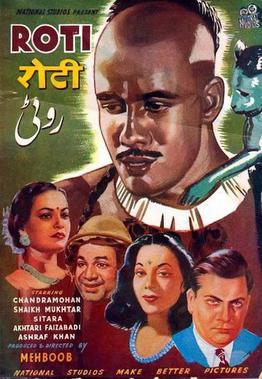
Roti is a 1942 Indian Hindi film directed by Mehboob Khan. This movie was anti-capitalist.

Taqdeer is a 1943 Indian Hindi language comedy film. It was directed by Mehboob Khan under his Mehboob Productions banner. The star cast included a young Nargis in her first lead role along with Motilal, Chandra Mohan, Charlie, Jilloobai and Kayam Ali.

Patanga is a 1949 Indian Hindi-language romantic comedy film. It was the first film produced and distributed by Varma Films; yet,It was the seventh highest grossing Indian film of 1949. The film was directed by H. S. Rawail based on a story written by his wife Anjana Rawail. Rajendra Kumar, who would become one of the leading actors in Indian cinema, worked in Patanga as an assistant to director H.S. Rawail and also had a cameo in the film. A duet sung against the backdrop of WW2, "Mere Piya Gaye Rangoon", picturised on actor Gope and lead heroine Nigar Sultana became popular. The playback singers for the song were C. Ramchandra, who also composed the music for the film, and Shamshad Begum. The cast included Nigar Sultana, Shyam, Yakub, Gope, Purnima, Shyama, Randhir and Mohana.

Zohrabai Ambalewali was an Indian classical singer and playback singer in Hindi cinema in the 1930s and 1940s. She was considered one of the most popular female playback singers of early and mid 1940s.

Yahudi Ki Ladki is a 1957 Indian Hindi drama film directed by S.D. Narang, starring Madhubala and Pradeep Kumar as leads. The film became a silver jubilee hit on its release in January 1957.

Bahen is a 1941 Hindi film directed by Mehboob Khan. Sagar Movietone had closed down at the start of WW II and reformed as National Studios. It was under the new banner that Mehboob Khan produced his three important films of that time, Aurat (1940), Bahen (1941) and Roti (1942). Written by Babubhai Mehta and Zia Sarhadi, it had dialogues and screenplay by Wajahat Mirza. The cinematography was by Faredoon Irani. Anil Biswas was the music director with lyrics by Safdar Aah. The cast included Sheikh Mukhtar, Nalini Jaywant, Harish, Kanhaiyalal, Husn Bano, Swaroop Rani, Baby Meena and Bhudo Advani.

Chandni Chowk is a 1954 classic Muslim social drama film directed by B. R. Chopra.
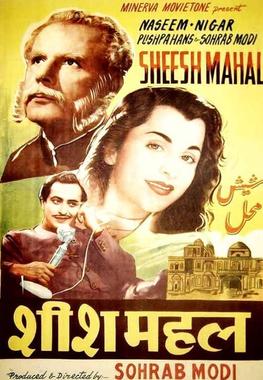
Sheesh Mahal is a 1950 social Urdu/Hindi film produced and directed by Sohrab Modi for Minerva Movietone.
Manjhdhar or is a 1947 Hindi/Urdu historical drama film produced and directed by Sohrab Modi for Minerva Movietone. The story was by Pandit Sudarshan, with art direction by Rusi K. Banker and sound recording by M. Eduljee. It had music composed by Ghulam Haider, Gyan Dutt and Anil Biswas, the lyricist was Shams Lucknowi. The film starred Sohrab Modi, Khursheed, Surendra, Eruch Tarapore and Rafiq Ghaznavi.

Sawan Aya Re is a 1949 Hindi romantic drama film, directed by Kishore Sahu. Produced by Sahu under his "Hindustan Chitra" banner, it had Khemchand Prakash as the music director. The cast included Kishore Sahu, Ramola Devi, David, Pratima Devi, Ramesh Gupta, Sofia and Mohana.

Surendra was an Indian singer-actor of Hindi films. Known by his mononym, Surendra was born and educated in Punjab to be a lawyer by profession. He came to Bombay to become a singer on the recommendation of a Delhi distributor and his friends. He was "picked" by Mehboob Khan whom he met at Sagar Movietone, to sing and act in films as an alternative to the then Calcutta-based singer-actor, K. L. Saigal. Surendra started his career with his debut starring role in Deccan Queen (1936), directed by Mehboob Khan. He soon became a part of Sagar Movietone when his song "Birha Ki Aag Lagi More Man Mein" from the film became an "instant hit".

Bibbo was a music composer, singer and actress who worked in both Indian and Pakistani films. She acted in Indian cinema from 1931 to 1947 before moving to Pakistan, following Partition of India in 1947. She started her acting career with Ajanta Cinetone Ltd. in 1933, working with directors like M. D. Bhavnani and A. P. Kapoor. She was one of the top leading ladies of the 1930s along with actresses like Devika Rani, Durga Khote, Sulochana, Mehtab, Shanta Apte, Sabita Devi, Leela Desai and Naseem Banu. She was referred to as "one of the most important female stars of the 1930s and 1940s". Her fame had her featured in the lyrics of a popular song from the film Gharib Ke Lal (1939) sung by Mirza Musharraf and Kamla Karnataki, with music by Sagheer Asif and lyrics by Rafi Kashmiri. "Tujhe Bibbo Kahoon Ke Sulochana", where Sulochana referred to another popular actress of the time. This was the first time a song featuring famous actors was used in the lyrics of a film song.
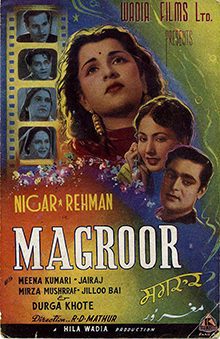
Magroor (transl. Proud) is a 1950 Indian Hindi-language romance film produced by J.B.H. Wadia and directed by cinematographer R.D. Mathur.
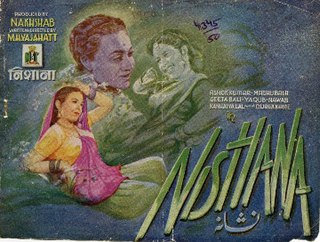
Nishana is a 1950 Indian Hindi-language romantic drama film directed by Wajahat Mirza, and starring Madhubala, Ashok Kumar and Geeta Bali. The film's music was composed by Khurshid Anwar.

















